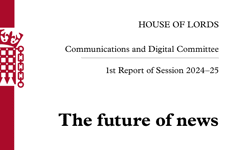As reported by the National Union of Journalists:
Investigatory Powers Bill: Threats to sources, journalistic safeguards and Hollins amendment
If the current version of the bill passes into law then it will enable unjustified state interference in quality journalism and investigative reporting. The union has been campaigning against state surveillance for the last two years. The current bill sets out a new legal framework for the state to be able to identify and expose journalistic sources and whistleblowers. The Home Office argues that information contained on mobile phones and electronic devices belongs to the service provider rather than the individual or organisation that pays the bill. This means the state is under no obligation to contact a journalist or media organisation when they access the information stored.
The state's powers of surveillance are vast. They include the interception of communications and the authorities can listen to telephone calls and read emails. They can also access computers or mobile devises regardless of encryption and items stored can be altered or deleted. They can access documents, diaries, contact books, photographs, messaging chat logs, and GPS location records. They have the power to access all internet browsing histories and what is typed into a device, including login details and passwords. Draft documents and deleted files can also be accessed and the microphone, webcam or GPS-based locators can be turned on. The surveillance state collects information about everyone, without regard to innocence, guilt or consent.
If journalists don’t know their work and their sources are being compromised then it becomes practically impossible to uphold the union’s ethical code of conduct enshrining the principle to protect sources. The judicial commissioner's role in the process, specified in the bill, will not include collecting evidence from a journalist and they can’t consider all the facts of the case before deciding whether or not the state can access journalistic communications. The bill lacks sufficient safeguards for sources and whistleblowers, and is an unprecedented attack on long-established and legally upheld commitments to the vital need to protect sources and whistleblowers. If this bill is passed into law then we expect and will support legal challenges to it.
The NUJ supported the general principles in section 40 of the Crime and Courts Act 2013 that deals with the award of costs and clearly there is a need for a meaningful and reasoned debate about its implementation.
However the NUJ does not support Baroness Hollins’ related amendment to the Investigatory Powers Bill that expands on defamation and privacy and includes illegal access of communications (phone hacking/tapping). This amendment is completely new, it has not been thoroughly debated and the potential implications are detrimental and wide-ranging. The amendment would enable claimants to infer that a story could not have been obtained without phone hacking – this would put the burden of proof on the journalist to prove it was not, further pressuring journalists to betray their sources and working practices or else face punitive damages. Inserting this into a bill that already does so much damage to journalistic practice and principles is wrong-headed and counter-productive.
The government has launched a public consultation about Section 40 – this provides the opportunity for the issues raised by the Hollins amendment to be considered as part of that process rather than inserted into the bill.
The NUJ is calling on all MPs who care about journalism and press freedom to vote against the Hollins amendment to the Investigatory Powers Bill. The Amendment will be debated again in the Commons on Tuesday 15 November 2016.
Digital Economy Bill: Chapter 1 of Part V Clause 33 and clause 32 (4)
This government clause proposes criminalising passing on information that has been unauthorised for sharing. This will have a damaging impact on journalists and journalism by creating new restrictions on journalistic work.
The draft bill includes the imposition of criminal penalties for any individual, including journalists, who share information. There are already sufficient provisions in existing law covering confidentiality, employment, misconduct in a public office, data protection and official secrets. This clause needs to be amended to recognise the role of journalists and the public interest.
The NUJ is also concerned about clause 32 (4) proposing to extend the concept of personal information (and the associated privacy entitlements) to corporations.
The NUJ is urging the government to delete this clauses from the bill or at least insert sufficient journalistic safeguards.
[LORDS] Police and Crime Bill: Amendment 231A
Several elements of this proposed Lords amendment would have a severe and chilling effect upon journalism and make some aspects of news photography illegal.
The proposal may be well intentioned as a way to tackle stalking but it contains significant and severe implications for journalism. It offers no extra protection to the victims of genuine harassment, while criminalising photography - professional or amateur - and also has the potential to severely limit investigative reporting.
If this amendment is accepted then journalists could face not being able to take photographs or carry out their investigation until a court subsequently finds them not guilty. The amendment also shift responsibility for actions – often driven by media owners and editors – away from organisations and on to individual journalists, whether staff or freelance.
Media employers put substantial pressure on their employees and freelance journalists, as the NUJ clearly demonstrated in evidence to the Leveson inquiry. Furthermore, freelances do not necessarily have the legal back-up to decide what is or is not in the public interest; they rarely have the privilege of being able to turn down work and are usually working under the pressure of tight deadlines. The amendment creates a legal threshold of public interest and pushes the responsibility for that onto an individual photographer or journalist when they do not necessarily have the full details of the story and may be working to a brief presented to them by the commissioning company.
For example, in order for media organisations to preserve exclusivity, it is not uncommon for photographers not to be given the full information by news organisations about why the person they are sent to photograph is newsworthy. There are a lot of criminals or those who abuse their power or access to power who will be delighted to be able to use this proposal to curtail legitimate investigative reporting. The NUJ urges Peers to reject this amendment to the bill.












